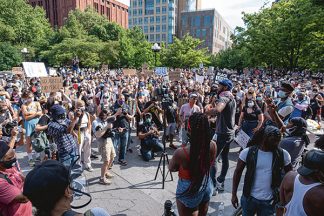By Kambiz Shekdar, Ph.D.
Since the first Gay Liberation marchers took their first steps in the West Village on June 28th, 1970, “Pride” has gone from a protest march to a glitter-filled sparkle parade. We are grateful for so much to celebrate, and are confident that re-focusing the energy of the annual NYC Pride parade will have a more powerful and lasting impact on the LGBTQ community.

The parade organizers, Heritage of Pride (HOP), and its leadership have successfully built and grown the parade into what it is today. While the organizers earn millions in sponsorships from corporate America, however, this money is not being used effectively to benefit the community. Organizers also charge non-profits so heavily to have a float or to pass out free literature that many of the smaller groups have stopped participating altogether. Some members of the LGBTQ community have become so disillusioned by the over-commercialization of NYC Pride that Reclaim Pride was mounted as a new counter-protest held on the same day as the larger parade.
LGBTQ organizations have fought hard to win the support of corporate America—support that remains vital for funding on-going achievements. As custodians of the parade on behalf of the LGBTQ community, we believe the parade organizers need to give back to the community in a meaningful and significant way. With the parade canceled for the first time in 50 years because of the SARS coronavirus pandemic, this may be a good time to take another look at NYC Pride and examine where we go from here. Let’s see if we can find a new model which we can all get behind and support by the time we get back into action in 2021. Any improvements may help the LGBTQ community achieve its next 50 years of milestone successes, including an end to state-sanctioned killings of gays, a worldwide ban on conversion therapy, LGBTQ and HIV+ immigration equality, trans rights, and cures and vaccines for HIV/AIDS among other goals.
The goal is to engage the broader community in a search for solutions. We encourage WestView readers to submit proposals and ideas. You can share any fresh new ideas with our LGBTQ editor at kambiz.shekdar@rftca.org. In addition, NYC Pride is a public organization that encourages participation. For more information, to get involved, and to find out when meetings are taking place, anyone interested can email secretary@nycpride.org.
The proposed formula for greater LGBTQ equity, unity, and corporate social responsibility for our continued and combined success:
- At least 50 percent of all corporate donations in connection with NYC Pride must go directly to LGBTQ community and non-profit organizations.
- The parade organizers can facilitate these partnerships by collecting and sharing information about each interested community group with interested corporate sponsors.
- Corporate sponsors could then indicate which one or more groups they may be interested in supporting financially, and how much (possibly based on a menu of pre-set options), with mutual agreement from the organization(s) seeking support.
Any and all LGBTQ non-profit and community organizations would be encouraged to participate in establishing and implementing these proposals. Revered and established organizations such as God’s Love We Deliver and the LGBTQ Community Center may attract the larger sponsorship packages while newer organizations like TransNewYork or Research Foundation to Cure AIDS may get their first sponsorship dollars from smaller corporate donors, all of which would need to support a non-profit in order to participate in the parade.
The secondary and transformative effect of these proposals is that non-profits would have the funding and support they need to share their message during Pride, with spectators assembled to hear it. In addition, new relationships will be forged between the corporations looking to support the LGBTQ community and organizations that vitally need them. Our proposals allow sponsors to identify those organizations whose missions are in line with the priorities of their LGBTQ Employee Resource Groups (ERGs) and external community initiatives.
The parade organizers should be the first ones to support these changes, precisely because they are the guardians of a movement that is of, by, and for the LGBTQ community. HOP can also make the full list of participating organizations and their contact information publicly available, creating a database for use by prospective donors who wish to identify and support LGBTQ causes.
Because the devil is in the details, let’s consider these: More restrictions are needed. It must be stated bluntly that more funding of certain organizations does not alter placement in the parade line-up. Lawyers don’t get to lead the parade just because a major New York law firm throws a big bone to support gay lawyers. Those edgy moments, ACT-UP “dying” in front of St. Patrick’s Cathedral, are sure to be lost if marchers are afraid to interfere with cash flow. The Pride Parade is a buoyant and celebratory event, but please don’t let money remove the parade’s unifying community role. Consider the Super Bowl as your nightmare scenario: it used to be about football; now, it’s often only the advertisements that viewers remember. The plan also needs stronger steps to address how the funds are equitably distributed. A steering committee could be created, composed of organizers, leaders in the LGBTQ community, corporate representatives, and members of LGBTQ non-profits who could assist organizers and corporations in broadening the allocation of donations across non-profit groups.
Finally, with the surging #BlackLivesMatter movement in our vision, we hope these ideas may be encouraging and helpful as corporate entities begin to take responsibility and be accountable to the BLM movement as well. We are pleased to discuss these proposals with our brothers and sisters and to hear their views as we all forge ever-expanding alliances in the fight for our constitutional rights to life, liberty, and the pursuit of happiness.
Presented by:
Kambiz Shekdar, Ph.D., President of Research Foundation to Cure AIDS (RFTCA), and Science and LGBTQ Editor at WestView News.
Supported by:
Alan Cumming, actor, author, and activist
Bruce Anderson, former president of the LGBT Community Center
Brian Downey, President of the Gay Officers Action League (GOAL)
Calogero Salvo, former board member of the LGBT Community Center, independent filmmaker, and creator of first PSA for HIV/AIDS
Craig M. de Thomas, activist, entrepreneur, former board member of Gay Men’s Health Crisis (GMHC), and member, National LGBT Chamber of Commerce (NGLCC)
Ellie Covan, founder of Dixon Place
Father Graeme Napier, Rector at St. John’s in the Village
Gennifer Herly, Ph.D., founder and executive director of Trans New York
Karen Hagberg, board chair of Research Foundation to Cure AIDS
Lisa Cannistraci, activist, and owner of Henrietta Hudson
Lisa E. Davis, Ph.D., scholar, author, and activist
Patrik Gallineaux, Stoli LGBT manager and brand ambassador
Sherry Vine, international drag legend
Steven Marion, LGBTQ community organizer
Stanley Wlodyka Jiménez, community organizer and Executive Director of the New York City AIDS Memorial
Steve V. Rodriguez, executive producer/host of TAGSPODCAST (aka Talk About Gay Sex podcast)
William Self and Kevin Uhrin, LGBTIQ advocates


